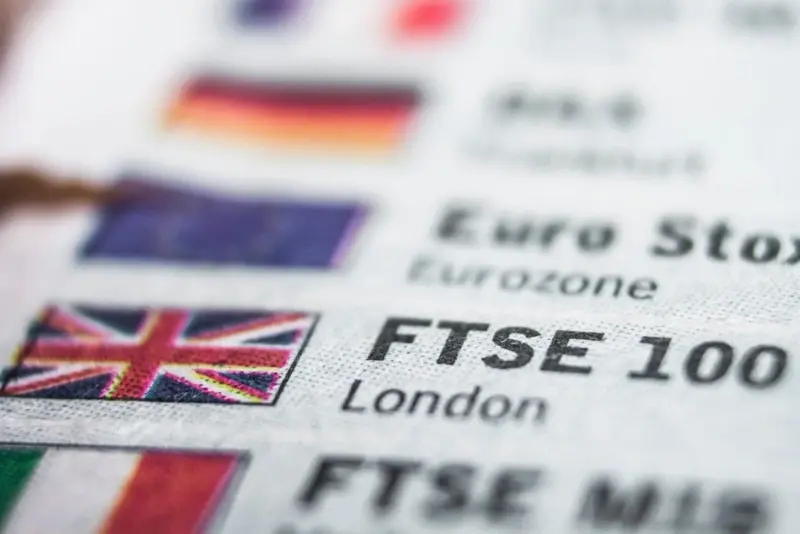
London shares rose strongly at the start of the new year, but the pound dropped against the dollar, as rail strikes threatened the UK economy and weak economic data from China raised concerns about global demand.
The FTSE 100 index opened up 133.78 points, 1.8%, at 7,585.52. The FTSE 250 was up 295.61 points, 1.6%, at 19,148.61, and the AIM All-Share was up 7.28 points, 0.9%, at 838.61.
The Cboe UK 100 was up 1.5% at 758.15, the Cboe UK 250 was up 1.4% at 16,599.17, and the Cboe Small Companies was up 0.5% at 13,299.65.
The UK stock market was catching up to gains made in Europe, which traded on Monday. The CAC 40 in Paris was up 0.6% and the DAX 40 in Frankfurt up 0.8% early Tuesday. The indices had closed up 1.9% and 1.1%, respectively, on Monday.
‘With numerous jurisdictions still out yesterday - US, UK, Japan - Europe‘??s first session of 2023 saw all boats rise together with both safe havens and risky assets entering the new year on the front foot,’ commented Rabobank. ‘Given the understandably quietened nature of the markets, however, it is hard to pinpoint a catalyst or thematic driver behind these moves.’
In London, investors were feeling optimistic, despite the UK economy facing fresh disruption, as further industrial action in the rail sector begins.
Tens of thousands of rail workers are taking strike action in bitter disputes over pay, jobs and conditions.
Members of the Rail, Maritime & Transport union at Network Rail and 14 train operators will stage two 48-hour walkouts from Tuesday and Friday, while drivers in the Aslef union will strike on Thursday.
Passengers, including those returning to work after the festive break, are being warned to expect ‘significant disruption’ as only a limited number of trains will run.
Sterling was quoted at $1.1915 early Tuesday, sharply lower than $1.2054 at the London equities close on Friday. The euro traded at $1.0576 early Tuesday, lower than $1.0686 on Friday. Against the yen, the dollar was quoted at JP¥130.60, down from JP¥131.84.
In the FTSE 100, there was little in the way of corporate news, with broker ratings moving the needle.
Rolls Royce added 6.1%, as Jefferies raised the stock to ’buy’ from ’hold’.
SSE shed 0.6% as Jefferies cut the utility to ’hold’ from ’buy’. GSK lost 0.3% as JPMorgan cut the stock to ’underweight’ from ’neutral’.
In the FTSE 250, Hikma added 3.6%. JPMorgan raised the stock to ’overweight’ from ’neutral’.
The pharmaceutical firm also launched an authorised generic version of Xyrem1 oral solution CIII from Jazz Pharmaceuticals, which is generically sodium oxybate. Jazz reported net sales of $1.3 billion for Xyrem in 2021.
Inchcape rose 1.1% as completed the £1.3 billion acquisition of Derco, first announced back in July.
The automotive distribution firm said the acquisition will expand its leadership in Latin America, with Derco previously being the largest independent automotive distributor in the region.
Wizz Air added 4.1%.
The budget airline said it carried 4.2 million passengers in December 2022, a 58% increase year-on-year, with a load factor of 85%, compared to 75% a year prior.
On a rolling 12-month basis, it carried 45.7 million passengers - over double that of 21.7 million in the previous 12-month period.
The Budapest-based firm noted its new routes from Italy to Saudi Arabia, as well as the opening of routes from Austria to Saudi Arabia during the month.
Other midcap travel firms were performing well, with cruise operator Carnival up 5.6%, and holiday company Tui adding 5.5%.
Elsewhere, Cineworld fell 15%, as the beleaguered cinema chain put itself up for sale.
Responding to recent media reports, the firm said that neither it, nor its lenders and advisors, have participated in discussions with US rival AMC Entertainment regarding any sales of its assets.
Starting from this month, however, it will run a marketing process, focused on proposals for the group as a whole. This will run in parallel to the developing of a plan for a chapter 11 reorganisation, Cineworld said.
On AIM, Helium One shares tumbled 26%.
The helium explorer said the Exalo drill rig in southern Africa will be unable to be mobilised for its Rukwa licence in early 2023.
This is due to an extension of the current operator’s contract, for a period of ‘up to twelve months’.
‘The company is reviewing a number of alternative rig options for Phase II Tanzania drilling operations and will announce an updated timeline to drilling once new arrangements have been confirmed,’ the firm said.
CEO David Minchin called the development ‘disappointing and frustrating’.
In Asia on Tuesday, Tokyo was closed for a holiday after New Year’s Day. The S&P/ASX 200 in Sydney ended down 1.3%. In China, the Shanghai Composite closed up 0.9%, while the Hang Seng index in Hong Kong closed up 1.8%.
The latest purchasing managers’ index revealed continuing weakness in China’s manufacturing sector.
The Caixin manufacturing PMI reading slipped to 49.0 points in December from 49.4 in November. The reading is below the 50-point mark separating growth from contraction.
Official PMI survey figures released over the weekend showed a reading of 47 points, compared to 48 in November, according to the National Bureau of Statistics.
In the US on Friday, Wall Street ended slightly lower, with the Dow Jones Industrial Average ending down 0.2%, the S&P 500 down 0.3% and the Nasdaq Composite 0.1% lower. New York was closed on Monday.
Brent oil was trading at $86.21 a barrel early Tuesday, higher than $83.21 late Friday.
Gold was quoted at $1,848.74 an ounce, up sharply from $1,818.60.
In the economic calendar on Tuesday, there are manufacturing PMIs from the UK at 0930 GMT and the US later in the day. The German consumer price index is at 1300 GMT, with unemployment figures to be released shortly.
Copyright 2023 Alliance News Ltd. All Rights Reserved.




